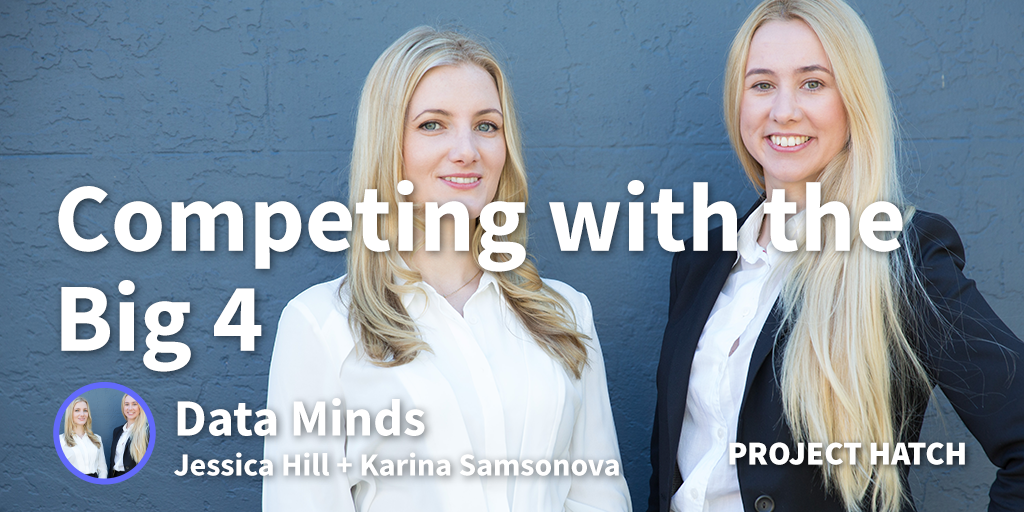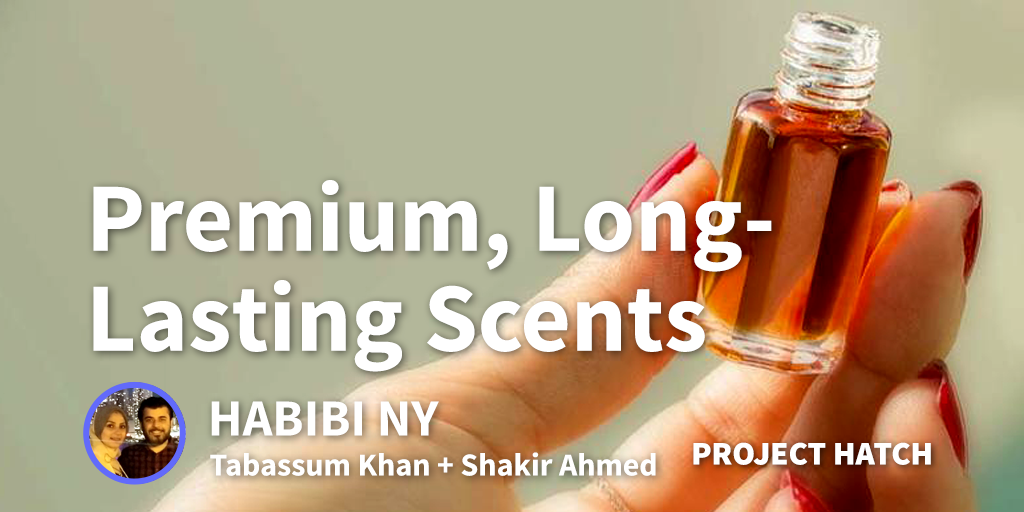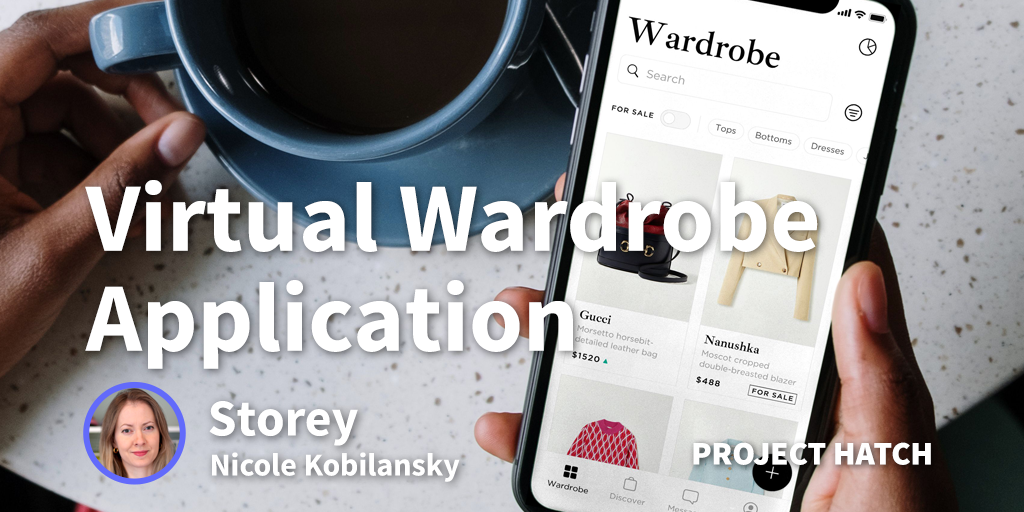I saw a data model produced by one of the Big 4 accounting firms that cost a fortune (more than my yearly salary), and I was building much more sophisticated models for my employer. Jess and I were working together, and the next day I went into the office and told her ‘what if we start building the same cool stuff we do at work, but for other people? There is obviously a need for it’. Jess smiled and didn’t say anything. Three days later she texted me and said ‘let’s do it.’
Our first project was such a crazy time. We were still at our full-time jobs, Karina was studying for her CPA exams, we were working late nights, weekends, rushing across Sydney for meetings during lunch breaks, barely sleeping, but we were on top of the world.
After completing the project we knew we were onto a winner. We cracked open a bottle of champagne and quit our jobs the next day.
Karina: We have never raised money. DataMinds is a consultancy, we don’t have any significant upfront costs like companies that develop a product (apps) or retailers, who need to buy stock. Our revenue covers our salaries and other overheads and allows us to grow organically. Potentially one day if we come up with the product idea or decide to expand rapidly, we would seek investment.
How do you attract clients?
Jessica: Our clients range from tech start-ups through to established enterprises and government. Any organisation that is collecting and storing data needs to be utilising the insights in that data to improve and innovate, otherwise the data just becomes a liability. DataMinds helps organisations do that by providing analytics and data science consulting services.
Karina: To find our first couple of clients, we spammed the whole world. We called/texted/emailed everyone and anyone we knew or heard of. Sometimes I was walking down streets and writing down any companies name I was able to notice in order to email them later. So it was all cold-calling, cold-emailing at first. Luckily later we started getting clients by word of mouth.
Jessica: One of the more strange projects we’ve had has been to analyse traffic from adult sites. Karina and I would be sitting at our desks discussing which ‘acting’ category would convert better. In the end, no matter what the industry, data is data.
How did you fund the idea initially?
Jessica: The early stages of DataMinds was basically a year of blood, sweat, tears, and rejections. No one knew who we were, the value of data science was still not widely understood, and we pitched to a lot of people who just couldn’t believe that two blonde women could have the experience and technical skills to be data scientists. It was a tough few months, but we persevered, built up our network, secured a couple of small projects that then led to big projects, and built up our reputation.
Karina: Finding our first full-time employee was a very hard task for us. It is a huge responsibility. When you hire somebody, you become responsible for them, their families, mortgages. We are totally bootstrapped, we don’t have any funding so we always knew even if we have very bad months we still would have to pay salaries, potentially from our savings accounts. Also, Jess and I have been working together for a long time and thoughts about bringing in somebody new to a dream-team really scared me. At first we hired a couple of contract employees, to see if we have enough of work of everyone, and a few months later we found our third Musketeer, the first full-time employee.
I think when you are a small team, cultural fit is very important. So I would suggest having a couple of interview rounds and get every team member to the interview, to make sure they are comfortable with the new addition to the family.
What were your family and friends first thoughts you creating your own your company?
Karina: My family was very unsupportive with the idea of me running a business. Every phone call was starting with the phrase “When would you find a proper office job?”. Japanese language has a beautiful word “Kuyashii” which is “when somebody says you can't do something and you have this burning desire to prove them wrong”. I think this is how I felt back then. I guess my parents attitude kept pushing me no matter what.
In contrast, my friends were very positive about my decision to quit a full time job and start an entrepreneurial journey.
What is the end goal?
Karina: Aston Martin is my ultimate end goal! Jokes aside, I think nothing motivates you better than hunger and absence of plan B. I grew up in poverty: post Soviet time, potato for breakfast, lunch and dinner, clothes made out of curtains, playing football with dead pigeon. I am obviously over exaggerating , however it was very hard from time to time. So I think some kind of fear of poverty pushes me when things go wrong. Also, I know that crisis is a temporary thing and sooner or later things get easier.
I am proud of every project we do. Whether I am fixing financial model for the bank, or writing scripts to do sentiment analysis of CRM data for a retail company, I got very excited by final results. However, there is one project that I am incredibly passionate about. We work with a government agency where results of our job can literally save somebody’s life. For me it is an honour to use my skills with such amazing purpose. This project even changed my parents’ opinion about my business, I think they are very proud of me now.
Do you have any advice for someone starting out?
- find a mentor. On the various stages of maturity of your business you potentially need different people with different experience and skills. Sometimes you just need someone external, who is not emotionally attached to the business and can give you an objective opinion. 2) done is better than perfect. Your product/idea/services will never be perfect, so you just need to go to the market to test it out and see if there is any need for it.
What are the top 3-5 apps your business could not run without?
Aside from the tools and apps that we use for our data science and analytics work, we keep everything else pretty simple.
Xero has been brilliant for our accounting. It’s user-friendly and inexpensive.
LinkedIn is great for networking.
Everyone seems to use Slack, but we tried it and found it to be another annoying thing to keep track of, so we just stick with Outlook for most of our communication.
Are there any new services you’re working on? And would you ever sell?
Jessica: I’d love to continue to grow our team while retaining our culture and values. We take a lot of pride in the work we do, and we have a no-BS approach that keeps it real both within our team and with our clients. Everyone knows exactly what’s going on, what to expect, what needs to be done, where they stand.
I have no time for politics and pointless meetings, and too many brilliant companies have fallen victim to growing too quickly and ending up going down that route. We all work really hard to keep pushing the envelope to stay ahead of the curve and solve problems with the latest data science techniques and technology. There are so many important problems out there that still need to be solved.
Karina: As for selling the company - never say never, however it is not in our plans for the nearest future. I love coming to our office; I absolutely enjoy meeting new people and learning about other businesses, even if it involves a stressful pitch at the beginning of the conversation; I like dynamic of entrepreneurial journey. DataMinds might pivot its direction, we might start providing other services as well or develop a product, but I am not sure if I want to sell it.
| Company Name: | Data Minds |
|---|---|
| Founder: | Jessica Hill + Karina Samsonova |






